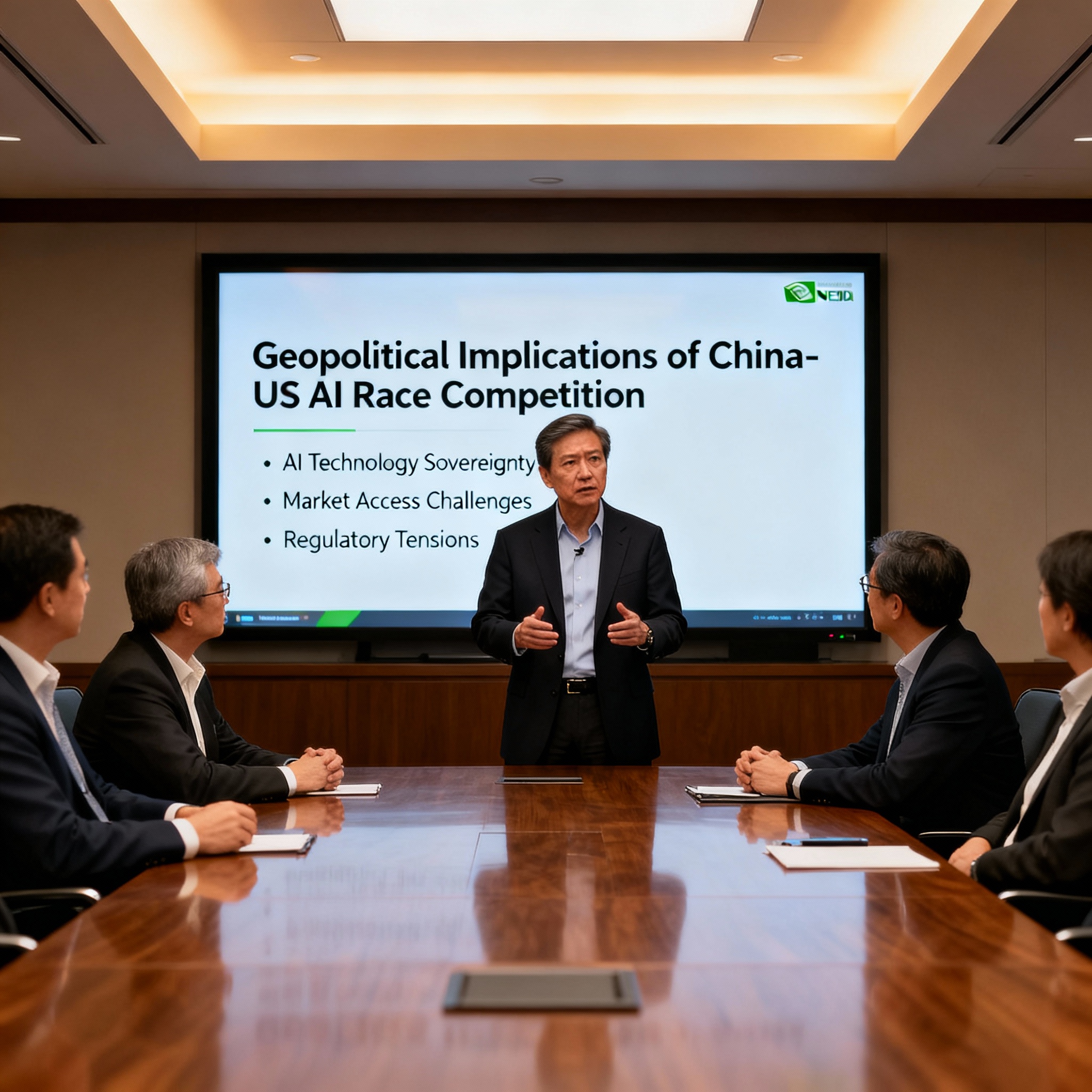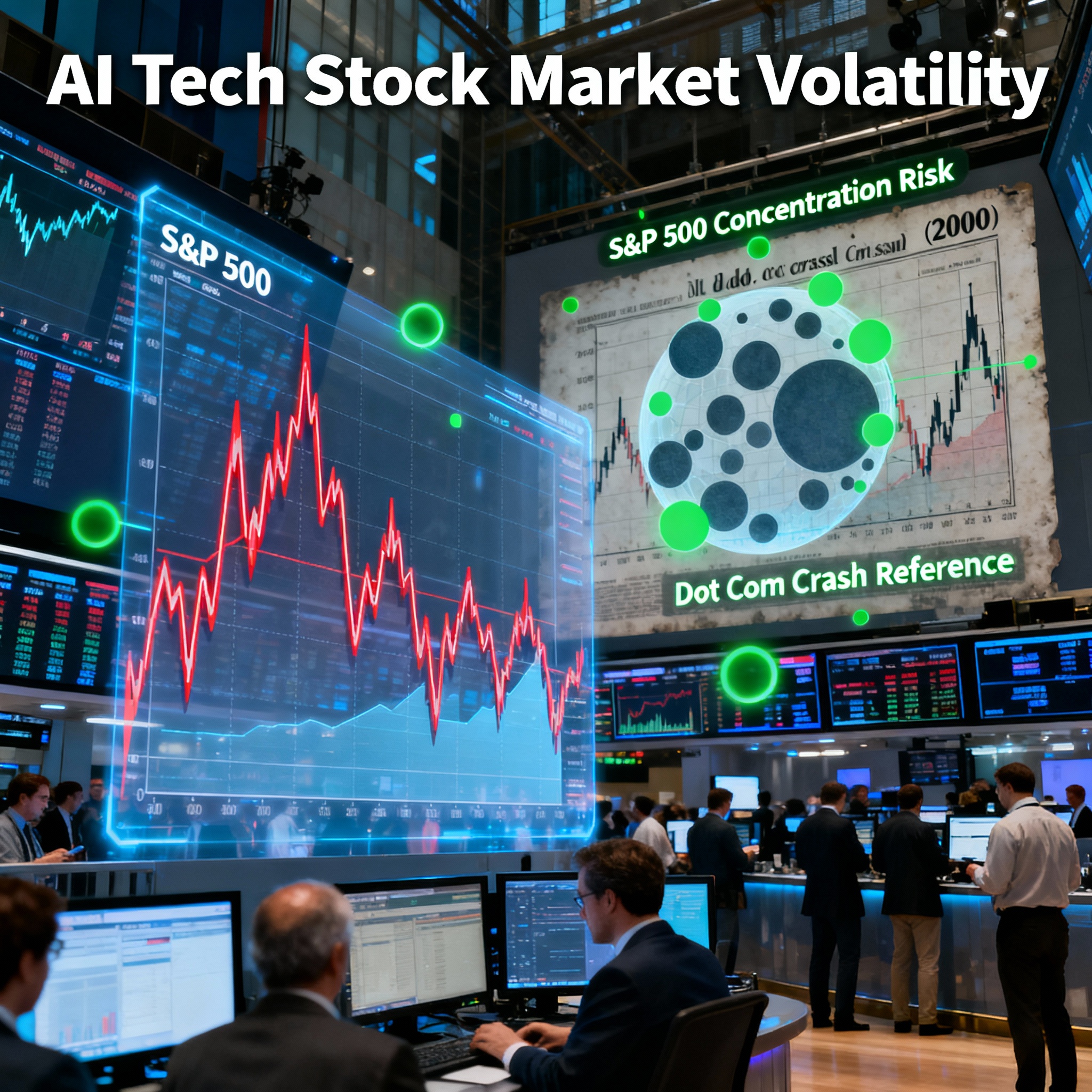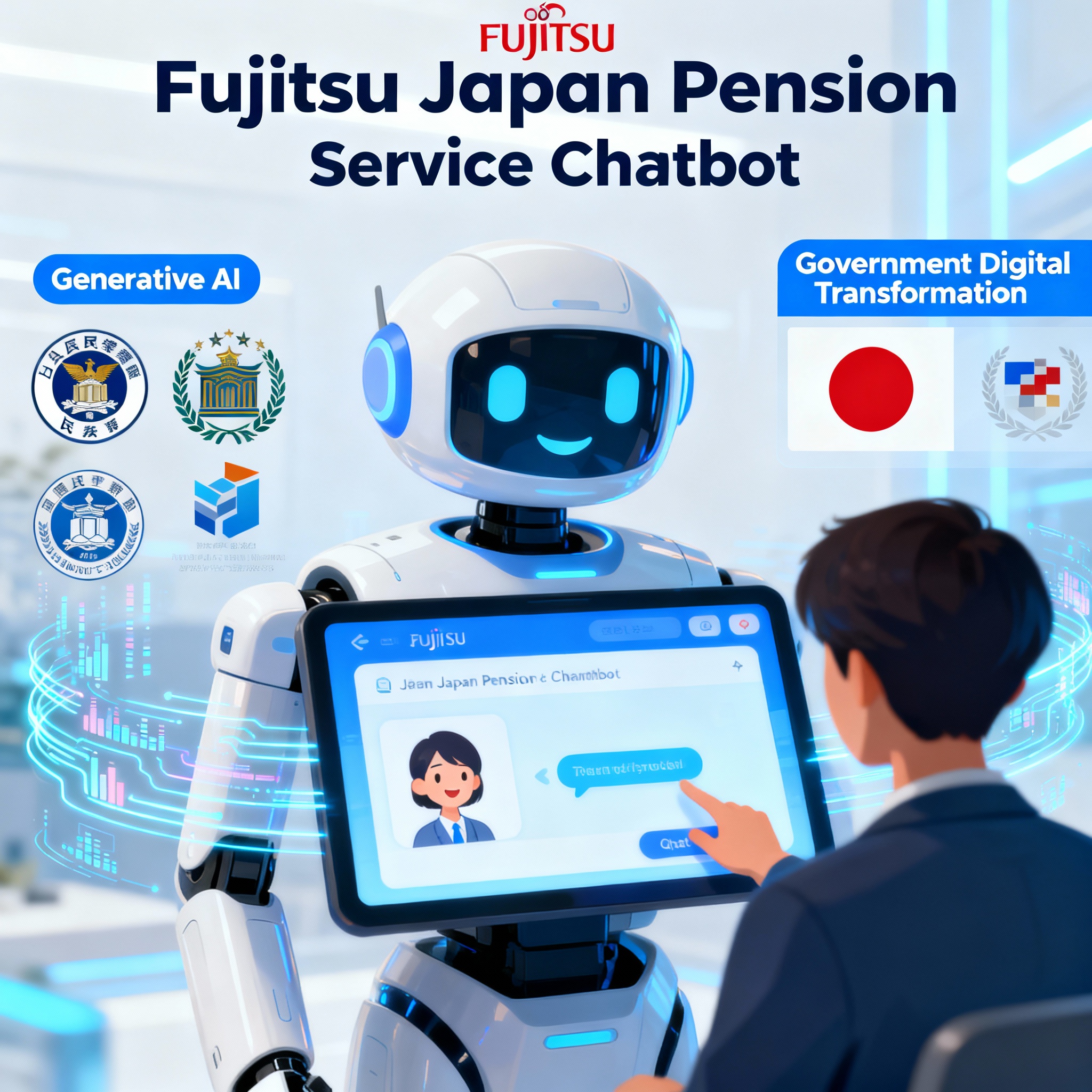The AI landscape is fraught with tensions, from geopolitical rivalries and infrastructure costs to the consolidation of power among tech giants. Understanding these tensions is crucial for navigating the future of AI and avoiding potential pitfalls. Gain actionable insights by recognizing the 2026 inflection point, where the industry must transition from hype to tangible results to maintain investor confidence.
Geopolitical AI Rivalry: Nvidia CEO Sounds the Alarm on China

The escalating geopolitical rivalry in AI took center stage recently, with Nvidia CEO Jensen Huang sounding the alarm on China's potential AI dominance. Speaking at the Financial Times' Future of AI Summit, Huang didn't mince words, highlighting factors that could give China an edge in the AI race.
China's Competitive Advantages
Huang pointed to China's state energy subsidies as a significant advantage, effectively providing its AI developers with 'free' computing power. This contrasts sharply with the West, where, according to Huang, 'cynicism' and regulatory overreach are stifling AI innovation. He expressed particular concern over the growing patchwork of fragmented state-level AI regulations in the U.S., fearing they could create unnecessary hurdles for companies trying to innovate.
Clarifying China's Capabilities and Nvidia's Challenges
While his warnings were stark, Huang later clarified that China's AI capabilities are only 'nanoseconds behind' America, emphasizing the intense competition rather than a complete technological gap. However, Nvidia faces unique challenges in the Chinese market. Security reviews and export restrictions have created significant headwinds for the company. The U.S. export restrictions, in particular, have impacted Nvidia's ability to sell its most advanced Blackwell processors in China, forcing them to create modified versions to comply with regulations.
The Semiconductor Policy Chessboard
The situation is further complicated by ongoing discussions between political figures like Trump and Xi on semiconductor policy. Potential export allowances could shift the landscape, but the future remains uncertain. Huang has consistently voiced his opposition to export restrictions, arguing that they not only hurt American companies but also negatively impact the global AI developer ecosystem. He believes that restricting access to cutting-edge technology hinders innovation and ultimately slows down the progress of AI worldwide. For example, tools like TensorFlow are used by a wide number of global developers.
"These restrictions are not just about business; they're about the future of innovation itself." - Jensen Huang
Huang's concerns underscore the delicate balance between national security, economic competitiveness, and fostering a thriving global AI community. The decisions made by governments and corporations in the coming years will undoubtedly shape the trajectory of AI development for decades to come. Keeping abreast of these developments is crucial, so be sure to check our AI News section for the latest updates.
Apple's $1 Billion Bet: Partnering with Google to Rebuild Siri with Gemini AI
The tech world was set ablaze this week with news of Apple's audacious $1 billion annual investment in Google's Gemini AI to overhaul Siri. This partnership signals a major shift in the AI landscape and raises questions about Apple's long-term AI strategy. Google Gemini is Google's flagship AI model, designed to be multimodal and highly capable across a range of tasks.

The Reasoning Behind the Deal
Why Google? Sources indicate Apple chose Gemini over competing models from OpenAI and Anthropic due to Gemini's superior performance in on-device processing and its ability to be heavily customized for Apple's specific needs. This custom Gemini model boasts a staggering 1.2 trillion parameters, an eight-fold increase in complexity compared to the AI models currently powering Apple Intelligence. This leap in processing power is necessary to deliver the kind of sophisticated, context-aware interactions Apple envisions for the future of Siri.
Siri's 'Linwood' Transformation
The revamped Siri, code-named 'Linwood,' is slated to launch in Spring 2026 as part of iOS 26.4. The new Siri promises a dramatic improvement in natural language understanding, contextual awareness, and proactive assistance. A key element of this partnership is data privacy. To address these concerns, Google's custom Gemini model will run exclusively on Apple's Private Cloud Compute servers, ensuring user data remains within Apple's ecosystem and adheres to its stringent privacy standards. This setup aims to provide the benefits of advanced AI without compromising user privacy—a core tenet of Apple's brand.
Google's Growing AI Dominance and Apple's Admission
This deal cements Google's dominance in the smartphone AI ecosystem, with Android already deeply integrated with various Google AI services. For Apple, the partnership is, in some ways, an admission of falling behind in the race to develop internal AI capabilities. While Apple has made strides with on-device AI processing, it lacks the massive data sets and computational infrastructure necessary to compete with Google and other AI giants at the cutting edge of large language models. Apple intends to position Google as a "behind-the-scenes technology supplier," similar to how it relies on other companies for components like displays and memory chips.
Analyst Perspectives and Strategic Implications
Analyst views on the strategic implications of the Apple-Google partnership are divergent. Some see it as a pragmatic move that allows Apple to deliver a superior AI experience to its users in the short term. Others worry that it could make Apple overly reliant on Google, potentially stifling its long-term innovation in AI. Time will tell whether this partnership will be a stroke of genius or a Faustian bargain, but one thing is certain: it has fundamentally altered the dynamics of the AI race in the consumer electronics market. Stay tuned to AI News for further developments.
Enterprise AI Expansion: Fujitsu Deploys Generative AI for Japan's National Pension System
The relentless march of AI into enterprise solutions continues, this time making significant strides in public service. Fujitsu is set to deploy a generative AI-powered chatbot for the Japan Pension Service, a move poised to redefine how citizens interact with their national pension system.

Generative AI to Streamline Pension Inquiries
Scheduled for launch in April 2026, this AI chatbot aims to drastically improve the quality of responses to pension-related inquiries. Beyond just providing information, the system is designed to reduce the operational burden on human staff, freeing them up to handle more complex cases. This isn't just a simple upgrade; it's a strategic shift towards AI-driven efficiency in a critical public service. Imagine a future where getting answers about your pension is as easy as chatting with a highly informed, always-available AI assistant.
Breaking Language Barriers with Multilingual Support
One of the most impressive aspects of this deployment is its commitment to inclusivity. The chatbot will offer multilingual support, catering to a diverse range of users with options for English, Chinese, Korean, Portuguese, Vietnamese, Tagalog, and, of course, Japanese. This ensures that language is no longer a barrier to accessing vital information about pension benefits and procedures. Tools like DeepL, known for their translation accuracy, showcase how far multilingual AI has come.
Fujitsu's Uvance Platform: The Delivery Vehicle
The AI chatbot will be delivered through Fujitsu's Uvance platform, specifically designed to optimize consumer-business communication. Uvance acts as the infrastructure that enables seamless interaction, ensuring that users have a smooth and intuitive experience. This platform underscores Fujitsu's commitment to providing not just AI solutions, but complete, integrated systems that are ready to deploy and scale.
Riding the Wave of Japan's Digitalization Push
This initiative aligns perfectly with the Japanese government's ongoing digitalization push, which aims to streamline online procedures and improve citizen access to public services. In a nation facing significant demographic challenges and workforce shortages, AI is increasingly seen as a key enabler for maintaining and improving the quality of public service delivery. Think of it as using AI to fill the gaps and ensure that essential services remain accessible to everyone.
Building on Past Success with CHORDSHIP
It's worth noting that Fujitsu has previous experience in this arena, having implemented the CHORDSHIP chatbot system. Insights from usability testing and the CHORDSHIP implementation have undoubtedly informed the development of this new, generative AI-powered chatbot. It's about learning from the past to build a more robust and user-friendly future.
This deployment highlights the growing importance of AI in addressing real-world challenges, from workforce shortages to language barriers. As AI continues to evolve, expect to see more innovative applications emerge, transforming not just businesses, but also the way governments serve their citizens. For more insights into how AI is shaping the future, keep an eye on AI News for the latest developments.
Market Volatility and Systemic Concerns: AI Stocks and Infrastructure Costs
The AI market, while brimming with innovation, is proving to be as turbulent as the models it's creating, with volatility becoming a significant concern for investors and regulators alike. The aftershocks of Palantir Technologies' earnings report sent ripples through AI stocks, serving as a stark reminder of the sector's sensitivity to performance metrics and investor sentiment. This unease is further amplified by the technology sector's overwhelming presence in the S&P 500, now surpassing the levels seen during the dot-com bubble. While Nvidia shares showed resilience, buoyed by a recovery in Asian markets, cautionary signals from Wall Street titans like Morgan Stanley and Goldman Sachs, warning of a potential market pullback, cannot be ignored. The elevated valuations, reflected in the S&P 500's forward price-to-earnings ratio, hint at a market that may be priced to perfection, leaving little room for error.
AI: Bubble or Breakthrough?
The debate rages on whether AI represents a transformative breakthrough or an unsustainable bubble. The rapid market gains, largely fueled by the AI narrative, create a systemic vulnerability. If the promise of AI fails to materialize as quickly or as comprehensively as expected, the market could face a significant correction. It’s a high-stakes gamble where the potential rewards are immense, but the risks are equally substantial. To stay up-to-date with market trends, be sure to regularly check our AI News section.
The Looming Infrastructure Challenge

Beyond stock market fluctuations, the exponential growth of AI is placing immense strain on existing infrastructure. The surge in electricity costs, driven by the power-hungry demands of AI data centers, is a pressing issue. Experts estimate that a staggering $1 trillion in infrastructure investment is needed to secure new power supplies and ensure grid resilience. This raises critical regulatory questions about how these costs will be allocated between data centers and residential customers. Projections indicate that global data center spending could reach a staggering $7 trillion by 2030, underscoring the scale of investment required to support the AI revolution. As companies continue to develop new AI tools, such as Google Gemini and ChatGPT, the need for efficient infrastructure becomes even more critical.
This combination of market volatility and escalating infrastructure costs highlights the need for a cautious yet proactive approach to AI development and investment. Navigating this complex landscape requires careful consideration of both the potential benefits and the inherent risks.
Strategic Outlook: Navigating Tensions in the AI Landscape
Today's AI landscape is a fascinating, albeit tense, playing field where innovation, geopolitical strategy, and economic realities collide. Understanding these underlying tensions is critical for anyone looking to navigate the future of AI, from investors to developers to everyday users. Let's break down the key dynamics shaping the industry.
Geopolitical Chessboard: Export Controls and Nvidia's Tightrope Walk
At the forefront is the escalating geopolitical competition surrounding AI technology. Jensen Huang, CEO of Nvidia, recently voiced concerns about the potential harm caused by sweeping export controls. These controls, designed to limit China's access to advanced AI chips, are forcing Nvidia to walk a tightrope. They must balance national security interests with the economic imperative of maintaining access to the massive Chinese market. Nvidia's predicament highlights a core tension: the need to regulate AI development to prevent misuse, versus the risk of stifling innovation and creating competitive disadvantages for domestic companies. This is further discussed in AI News.
Consolidation of Power: Apple, Google, and Strategic Vulnerabilities
Another key tension lies in the consolidation of AI capabilities among a handful of tech giants. Apple's continued reliance on Google for search functionalities, despite its own AI ambitions, exemplifies this. While the partnership represents a pragmatic solution to a complex problem – building a world-class search engine is no small feat – it also exposes a strategic vulnerability. It underscores the reality that even the most powerful companies can't do everything themselves, leading to dependencies that competitors can exploit. To alleviate this issue, one could use Google AI Studio to develop their own internal AI tools.
The Infrastructure Tightrope: Costs and Market Sensitivities
A third critical tension revolves around infrastructure costs. The market's sensitivity to AI stock fluctuations is directly linked to the escalating expenses of building and maintaining the massive computing infrastructure required to power AI models. As AI models grow more complex, the cost of training and deploying them continues to skyrocket. This creates a situation where market enthusiasm can quickly turn to skepticism if investment levels don't translate into tangible returns. Companies might find Google Cloud AI a tool to offset this cost.
The 2026 Inflection Point: From Hype to Harvest
The industry is rapidly approaching a 2026 inflection point. The initial wave of excitement and experimental investment must now give way to measurable gains and real-world applications. This transition will be critical in determining the long-term viability of many AI ventures. The risk is clear: if the promise of AI fails to materialize into concrete benefits, we could trigger a market correction, as investors re-evaluate their positions and capital flows shift elsewhere. This is something our readers keep up with through our AI News coverage.
Navigating these tensions will require a blend of strategic foresight, technological prowess, and a healthy dose of realism. As the AI landscape continues to evolve, understanding these underlying dynamics will be essential for anyone seeking to thrive in this transformative era.
🎧 Listen to the Podcast
Hear us discuss this topic in more detail on our latest podcast episode: https://open.spotify.com/episode/2sfbdexMwNvdqz9YjGrZYj?si=ZBYTZjP8TRugafThOTirAw
Keywords: AI, Artificial Intelligence, Nvidia, Apple, Google, China AI, Siri, Gemini AI, Data Centers, AI Stocks, Geopolitical AI, Enterprise AI, AI Infrastructure, AI Regulation, Jensen Huang
Hashtags: #AI #ArtificialIntelligence #MachineLearning #DeepLearning #AINews
For more AI insights and tool reviews, visit our website https://best-ai-tools.org, and follow us on our social media channels!
Website: https://best-ai-tools.org
X (Twitter): https://x.com/bitautor36935
Instagram: https://www.instagram.com/bestaitoolsorg
Telegram: https://t.me/BestAIToolsCommunity
Medium: https://medium.com/@bitautor.de
Spotify: https://creators.spotify.com/pod/profile/bestaitools
Facebook: https://www.facebook.com/profile.php?id=61577063078524
YouTube: https://www.youtube.com/@BitAutor



